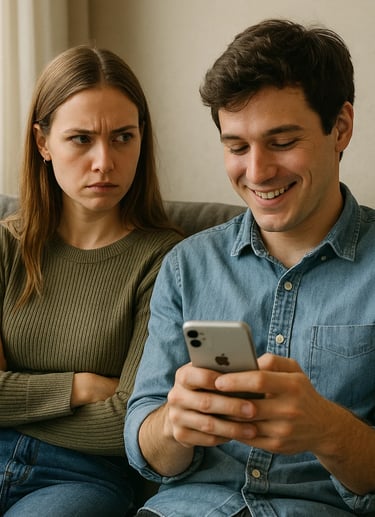Modern Love Unfiltered: Series 2
Can social media ruin your relationship? In this post, relationship writer Sofia Winters explores the subtle but damaging ways Instagram, Facebook, and other platforms affect our trust, intimacy, and emotional connection. Backed by psychological research and practical advice, this article helps couples identify toxic patterns, set healthy digital boundaries, and reconnect meaningfully offline. Part of the Modern Love Unfiltered series, this is a must-read for anyone navigating love in the digital age.
RELATIONSHIP LOVE SERIES
Sofia Winters
4/29/20253 min read


Why Social Media Might Be Slowly Destroying Your Relationship (And What To Do About It)
How Likes, DMs, and Endless Scrolling
Are Quietly Sabotaging Real Connection
It starts small.
A like here, a heart react there.
A quick scroll on Instagram before bed… until it replaces pillow talk.
Then come the double taps from people your partner doesn’t know, flirty comment threads, or the unspoken tension of “why didn’t you reply, but you posted a Story?”
Social media, while meant to connect us, is often quietly chipping away at our intimacy — and most of us don’t even notice until trust issues, communication gaps, or emotional distance start growing.
The Psychology of Comparison: The Relationship Killer
One of the most dangerous traps of social media in relationships? Comparison.
According to a study from the University of Missouri, people who frequently use Facebook are more likely to experience Facebook-related conflict in their romantic relationships — leading to breakups, cheating, or even divorce (Clayton et al., 2013).
We begin to subconsciously compare:
Our relationship to those filtered couple goals online.
Our partner to influencers or exes they interact with.
Our self-worth to how often we’re posted or acknowledged online.
And when that happens, even a healthy relationship can feel like it’s lacking — when it’s actually just private or realistic.
The Fine Line Between Transparency and Privacy
Here’s the truth: Not posting your partner doesn’t mean you’re hiding them.
But not communicating your intentions about social media definitely causes confusion.
Experts like Dr. Andrea Bonior, a licensed clinical psychologist, point out that “social media boundaries” are just as essential as real-life ones.
What are you both comfortable sharing?
What feels like a violation of trust?
What counts as disrespect online?
Most couples don’t talk about these until there’s already damage.
But having this conversation early builds trust and prevents unnecessary drama.
(Here’s a prompt: What’s one thing I post that makes you feel closer to me — and one thing that makes you feel distant?)
Solving the Problem: Setting Digital Boundaries That Heal, Not Hurt
So, how do we prevent social media from becoming a silent saboteur?
✅ 1. Define digital trust.
Decide what’s okay and not okay online — comments, follows, DMs, exes, etc.
✅ 2. Be present where it matters.
Studies show that phubbing — the act of snubbing someone in favor of your phone — damages relationship satisfaction (Roberts & David, 2016). Make phone-free time intentional.
✅ 3. Talk before you react.
Instead of assuming betrayal, ask: “What made you like this post?” or “How would you feel if I did this?”
✅ 4. Curate your feed.
Unfollow anything that makes you insecure or stirs unnecessary doubt. If your peace is costing you a scroll, it’s not worth it.
With You, Not For Show
At the end of the day, the healthiest relationships aren’t the most visible online — they’re the ones rooted in real conversations, real respect, and real connection offline.
Social media doesn’t have to destroy your love life… if you learn how to guard your connection from the noise.
With care,
Sofia Winters
Cited Sources:
Clayton, R. B., Nagurney, A., & Smith, J. R. (2013). The Dark Side of Facebook: The Role of Social Media in Marital Discord, Jealousy, and Divorce. Cyberpsychology, Behavior, and Social Networking, 16(10), 716-720.
Roberts, J. A., & David, M. E. (2016). My life has become a major distraction from my cell phone: Partner phubbing and relationship satisfaction among romantic partners. Computers in Human Behavior, 54, 134-141.
Bonior, A. (2019). The Friendship Fix. St. Martin's Press.


Explore
Your ultimate lifestyle hub for inspiration and tips.
Connect
Subscribe
© 2025. All rights reserved.
OnBlogz. Smart Living. Smarter Choices
Designed by ABC Global Solutions
